- Home
- Sherwood Smith
Inda Page 5
Inda Read online
Page 5
Shendan nodded once. “Just don’t mention it. And when you leave, don’t talk about us. To anyone.” She cast back a serious look from her wide-set eyes, then added, “This way. We have most of the castle shut up, since we are the only ones here.” She waved. “But you can have your choice of beds. There’s a great old thing, all carved over with horses, that my great-great-grandfather died in when he was assassinated. Want that room?”
“Only if there’s a ghost.”
Shendan laughed. “Do you see ghosts, then?”
“No. There’s supposed to be one at home. Jo . . . one person has seen it, and Tdor wishes she could see it. Maybe if I saw one here, she’d be satisfied.”
Shen pointed to a door beautifully carved with horse heads, kingscrown blossoms intertwined in their manes, and Inda felt strange when he thought of his mother at home here when she was Shendan’s age. For the first time he wondered what it had been like to grow up in this castle, and then, at around the age Tanrid was now, to suddenly be sent south to Tenthen, to marry a man she’d never met. He shook his head.
Shendan waved a hand at one of the hallways. “That leads to our rooms. I’ll put you right across here. It’ll make it easier for everyone, as the old king’s room is a day’s ride away.” She flapped her hand behind her at silent corridors leading off to other portions of the castle, measured off by steadily decreasing shafts of light from the high slit windows. “So, what is Tdor like?” Shendan gave him that funny smile again. “We will probably be bunkmates when I go to the royal city, as I understand she and I are the same age.”
“She’s . . . she’s . . .” Inda frowned. No one else had ever asked him such a question before. Tdor’s face rose vividly before his inward vision: her serious eyes, her sudden grin that made her bony chin even bonier, her quick, soft laugh. Her kindness to everyone, including the animals.
“You like her,” Shendan observed.
“I . . . she’s my Randviar,” Inda said, as if that explained everything. “We’ll be married one day.”
“Good enough. I’ll wait for . . . ah, here he comes.”
Inda had already heard the familiar sound of riding boots on flagged stones. A tall, thin boy midway between Inda’s and Tanrid’s age appeared at the top of the steps.
“My brother Savarend,” Shendan said. “This is Indevan.”
“Indevan-Dal,” said this newcomer by way of greeting. He had a strange sort of smile, one side curving up higher than the other, a sardonic smile suited to someone much older than he appeared to be. His eyes were the same color as his mother’s, not the muddy hazel usually called green, but a bright shade the color of spring grass. His hair was red, as unruly as his sister’s. It was wet, as if he’d come straight from the baths.
“Inda,” said Inda, feeling awkward.
Savarend raised a long, thin hand. “No, no. Formality only. They’ll be most chagrined if we display any hint of friendship.”
Brother and sister exchanged glances, quick as the flick of a firefly, but not too quick for Inda. He remembered Tdor’s last shaky-voiced warning: Don’t talk. Listen. That’s how you learn fastest where danger is, without drawing its attention.
So he said nothing, not even to ask who “they” might be, and when Savarend asked if Inda would like to see the treasures garnished from his duties at sea, Inda agreed.
On the ride away two days later, Inda reflected on how kind the Montredavan-Ans were, once Shendan had decided not to make him an enemy. Both of them were older than he, and therefore could have been expected to ignore a ten-year-old thrust on them. But they had made him laugh. Savarend had not only showed him curiosities gained from his travels as a ship’s boy (duly sanctioned by the treaty, obviously), but he’d told him stories about pirate attacks and terrible storms, about sea legends concerning Ghost Island, where all the dead killed by pirates were said to walk. Shen had shown him around that great castle herself, pointing once to the highest tower where her father apparently had a room. “We will not go there and you will not see him. It’s better that way,” she’d whispered under her breath.
Marend Jaya-Vayir, Savarend’s betrothed—who was also Inda’s second cousin—had kindly asked what foods he liked best to eat. The Jarlan, granddaughter of a queen, had brought him fresh bedding herself, and seen that he was comfortable.
But he had not met the Jarl, who stayed up in his tower, and so he told the Guard who was waiting at the border two days later, after the storm that struck soon after their arrival had blown past. Even though they were going to be very late to the royal city, they still had to stop at an inn there to be questioned. By then Inda understood how very rare it was for anyone to be permitted inside of Montredavan-An lands, and so he hid his impatience at the long, detailed interrogation. The captain of the King’s Guard and his two Royal Runners listened closely when he told about Savarend’s sea stories, and Marend’s baking, and Shendan’s pretty singing voice.
He had become convinced that Shen’s fit of anger, certain wry words Savarend said before laughing off the subject, were because they were the son and daughter of kings through both sides of the family. But for an assassin’s knife in the night he would be at the academy, and Shen would get to marry, have children. Not that she wanted any of that. Inda heard in the songs she picked that what she wanted was a life outside of Darchelde, in a new place, where she wouldn’t just grow up to be a Randviar with no Randael.
Inda, already missing his home, couldn’t understand that part. Though he looked forward to the academy, he wanted also to be home at Tenthan, with Tdor and his parents and cousins and friends and everything just right. He didn’t understand the desire to leave home forever, but he could sympathize with the wish for justice that would never come.
So he kept to himself the things he knew he was not supposed to have seen. Such as the looks of secrecy between mother and children, between brother and sister, and the expert way that Savarend had handled a knife when he thought no one was looking.
Chapter Four
“FROM this moment on, you have no rank.”
Twenty busy minds braced against the harsh voice while trying not to stare at the great stone walls or to listen to the ferocious rhythm of clashing steel from beyond the tallest wall as the echoing bells of noon died away.
“The ‘Dal’ added to some of your names, the deferential ‘son of Jarl of Whatever-Vayir,’ is mere courtesy. Signs of rank you haven’t earned, that you were merely born to.”
Of those twenty, some were distracted by the snapping of pennants in the wind, the wink of sunlight on the steel helms of the King’s Guard and the steel tips of the bows of the Queen’s Guard. One, the king’s second son, looked beyond at a sky as unnoticed by the rest as the distant cry of birds.
“Courtesy. There is no courtesy in war.”
Inda’s gaze snapped from those steel helms to the speaker.
Around him, two lines of weary, excited, easily distracted ten-, eleven-, and twelve-year-olds gave all their attention to their new leader, whose sun-lined face revealed none of his thoughts. Master Gand, veteran dragoon captain and now their principal tutor, easily read the expected delight, apprehension, excitement, and exhaustion in the young faces, and in several a poor attempt to hide a knowing smirk.
Not from Evred-Varlaef, though. The king’s younger son—small for twelve, with auburn hair, just like his father’s at the same age—looked down at the ground, his countenance shuttered.
Still watching them, Master Gand finished his speech. “From now on, you have only your family name. If I could take the ‘Vayir’ off of some of those names, I would. You’re here because your family, Vayir or not, has earned honor for its service. Your family. Not you. Your rank here must be earned, just as you’ll earn the right to wear your hair in horsetails. If you live.” Another pause. “You will call me Master Gand.”
Most now looked thoroughly intimidated, except for two of the smirkers whose expressions had altered to speculation. The third’s e
xpression had gone wooden.
“Most of you have older brothers here, the rest cousins who are heirs. This is the first year we’ve brought Shield Arms outside of the royal family for training, so there is no tradition. We’ve determined that you will be referred to by your family names, as I said, with the addition of Tvei when necessary to differentiate you from your Ains.”
Ain, tvei. One and two in Marlovan. So far, those were the only Marlovan words Master Gand had spoken outside of the titles he scorned. I will be Algara-Vayir Tvei, Inda thought, trying to accustom himself to the sound.
“You have liberty for the rest of the day. At the dawn bells, you will line up here, ready to begin work. Questions?”
One of the smirkers said, “What if it’s raining?”
“You will be here. In this line. Ready to begin work.” The threat—quite chilling—was back. “Further questions?”
The smirk vanished. As for the others, nobody wanted to ask questions, at least not here, though their minds burgeoned with nothing else.
“Firstnight bell for you younger boys is your supper mess, and you’d better be done eating when the older boys come in at second bell. Dismissed.”
Inda waited until others started moving; by showing up so late he had missed the tour, and had no idea where anything was. His arrival at this huge parade ground was still a blur of quick murmurs and pushing hands.
The others milled about, friends or relations banding together as they walked away. A big boy with long, pale hair gave a whoop and ran off. Another one said in a loud voice to the boy on Inda’s other side, “Come on, let’s get to Daggers before all the good tables are gone.” Neither boy glanced Inda’s way.
Daggers Drawn. He’d heard Tanrid talk about the academy’s own tavern so many times. But they only went after their father introduced them.
From the way these boys strutted the rule was clear, you still couldn’t just go. Someone—father, perhaps brother—still took you first.
Well, that was easy, then: no Daggers. Maybe never, Inda thought sourly, for his father almost never came to the royal city except when he was required to. That left Tanrid, who hadn’t been anywhere in sight, unlike some of the other, curious older brothers, and that brought another question probably no one would answer: why didn’t the order come before Tanrid left, so the brothers could travel together? Not that Inda really wanted to be under Tanrid’s orders on the road, but when he thought about it, it was strange.
“Lost?” A boy with reddish hair approached.
Inda nodded, tired thoughts instantly scattered.
“Where did you want to go?”
“Bunk.” Inda added, “Learn my way around before tomorrow.”
“Good idea,” put in a small, skinny boy with lemon-colored hair. He jabbed a thumb Inda’s way. “Like him, I just got here before noon.”
“Me too,” said another boy, and two more nodded. A fourth, a long-faced boy, just stood, looking resigned.
“Well, I can help with that,” said the one with reddish hair. “This here is the academy parade ground, where we’ll meet mornings the first week or so, I’m told, and then afterward when the entire academy assembles. We’ll have our own court at our barracks. Come along, if you like.”
All the boys in that uncertain little group were sensitive to tones of command; the redhead had invited, not demanded.
Satisfied, no one spoke. At home Inda would have asked questions, but he still remembered Tdor’s last words: Listen. That’s how you learn fastest where danger is.
Danger. He hadn’t really believed any danger would find him, not at the famous academy he’d never gotten tired of hearing about, but he’d agreed because their hearts hurt at parting.
Now that he was here in the royal city, and there were all these questions, he thought the advice good.
“Here’s what you ought to remember.” The redhead pointed upward. “That is the royal castle bell tower. Highest of all the castle towers. Everywhere you go, if you stop and find it, and fix its direction in your mind, you’ll learn your way about.”
Inda squinted. The noonday sun sat just above that tower.
“As for the city, its bell tower is at the south end. If you can see it or hear it, you can orient yourself in the city.”
Nods all around. The small boy with the lemon-colored hair said, “I take it you live here.”
The redhead glanced at Inda. His gaze went cloudy. “Yes.”
“Oh,” Lemon-hair observed. No one else spoke.
“So, turning this way from the tower, the scrub pit lies that way. Remember: three archways . . .”
The boys moved out of the parade court, watched, unseen and unknown, by Inda’s sister, Hadand-Hlinlaef, future queen. She sighed in relief when she saw the redhead near her brother’s dear, familiar form, as the last of them vanished under the mossy archway. How strange, how unaccountable to see her little brother here, he who should never have left home. She knew the order about this change in tradition must have come from him—the Sierandael—and that meant it was for no good reason.
She stepped back inside the secret passage.
Inda kept his back to the tower, aware of it behind him as he followed along the worn flagstones between the plain stone-and-wood barracks buildings. Scouting unfamiliar terrain using landmarks could be applied to cities, Inda realized. In the time it took to cross another court, his bewilderment, that sick sense of being lost, shifted to internal mapping, using the tower as principal landmark. Thus steadied inwardly, his eyes and brain continued the task almost without interfering with the stream of his conscious thoughts.
Most of that stream was concerned with the memory of his arrival, and speculation about the inevitable first meeting with his brother. Tanrid had not been among the seniors who galloped forth so suddenly from the academy gates just before noon, when Inda and his guard were arriving, so desperate, so anxious not to be late. Inda did not notice the age-smoothed stones under his new boots, nor the archways they passed through. Instead he saw the beautiful dashers in exact formation, tails high—as if they knew they looked good—and on their backs young men in new gray academy war coats, tight to the sashed waist, long and full-skirted for riding, their hair tied up in the horsetails of their plains-riding ancestors, the bugler calling a fall of three notes that caused citizens in the street to immediately give way so fast that the horses’ headlong pace was not checked, and they thundered by, smelling of horse and human sweat and oil and steel, a smell that filled Inda with yearning.
Inda had felt pride in his name, in his land, in his family. That pride had lingered until Captain Vranid and the Riders silently gave way to the horsetail-wearing seniors thundering by.
That’s what the arms master meant by earning, Inda decided, as the redhead said, “And the third archway. There’s our pit.” He dashed through the archway, the boys following as they scanned the clean-swept stones of their little court and the low stone-framed building beyond, with its plain wooden walls and row of glassless windows. All the shutters were open.
Pit. Inda and the boys at home had quickly nipped any bits of academy slang that Tanrid had let out, though all of them, especially Inda, had been beaten severely for presuming to use it.
“Our tack ought to be stashed by now,” the boy added, and Inda translated mentally: Someone got our gear in storage. Still in Iascan.
They clattered inside, their boots loud on the plank floor, and stopped in a clump, taking in the long room that smelled of old wood, dust, and wool, a particular blend of scents that worked its way down into the memories of every boy who came through here, evoking a welter of emotions.
Inda just stood, thinking I’m really here, and gazed at the two neat rows of empty wooden beds—only twenty, instead of thirty-six, the traditional maximum number of boys taken for training each year. Then he turned to the redhead to find he was being studied. Both boys glanced away before they could see one another flush.
Lemon-hair sighed. “Looks to
me like a good half of these bunks are already claimed. But lotsa choices are left.”
Inda cleared his throat and mumbled, “My brother said you don’t want to be near the door, where inspections are always worst.”
“Same with t’other end,” another boy said in the exact same tone—that of the younger brother with a deadly fear of being accused of frost, which was worse than mere strut. Anyone could strut, but frost was scorned as a kind of arrogant superiority, an assumption of rank. Strut might get you a clout, but frost could get you beaten, and everybody would say it was earned.
“Windows are best,” Inda ventured.
“Taken,” Lemon-hair noted gloomily, and all saw that each bed under a window was already made up, or had gear on it.
“Well, I see some free ones on that side in range of a window. When there’s a west wind there might be some air,” Redhead said, so carefully neutral he sounded half-strangled.
Nods, shuffles, furtive looks, and the boys decided they might claim them. Much better than being alone, and so far at least, none of these others seemed a pug, a frost, or a lick.
Conversation was easier by the time they’d each located their strictly regulation storage chest, lugged it in, and stashed it (properly squared) at the foot of their bunk. In their chests they each had sheets and coverlets, undyed and nearly indistinguishable, which they brought out. Inexpert hands did their best to smooth the bedding over the thin mattresses stuffed with old mail-quilting.
They all wore riding trousers, stockings, and riding boots, and the plain gray tunics, not much different than the smocks they wore at home, carried no device over the heart, which was also regulation; two of the tunics were obviously worn hand-me-downs from brothers or cousins, but no one said anything. Those who had everything new had, however they’d felt the day before about family and home, a desperate wish for the security of anonymity now, and were glad of the gray, protecting them from an accusation of strut or frost. For the first time in lives that were supposed to be spent within sight of the castle walls of home, no one knew who anyone was.

 Inda
Inda Danse De La Folie
Danse De La Folie King's Shield
King's Shield Whispered Magics
Whispered Magics Fleeing Peace
Fleeing Peace Barefoot Pirate
Barefoot Pirate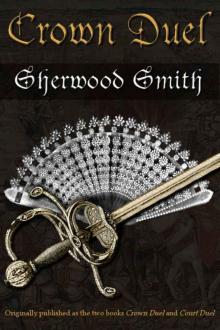 Crown Duel
Crown Duel Mearsies Heili Bounces Back
Mearsies Heili Bounces Back Commando Bats
Commando Bats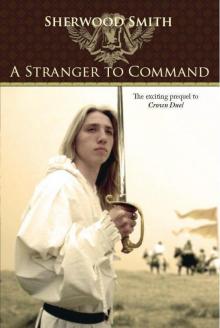 A Stranger to Command
A Stranger to Command Lhind the Spy
Lhind the Spy The Spy Princess
The Spy Princess Blood Spirits
Blood Spirits Sasharia en Garde
Sasharia en Garde Lhind the Thief
Lhind the Thief Paradise Drift
Paradise Drift Banner of the Damned
Banner of the Damned The Trouble With Kings
The Trouble With Kings Poor World
Poor World Treason's Shore
Treason's Shore Wren Journeymage
Wren Journeymage A Posse of Princesses
A Posse of Princesses Revenant Eve
Revenant Eve Once a Princess
Once a Princess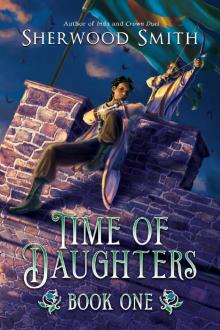 Time of Daughters I
Time of Daughters I Rondo Allegro
Rondo Allegro Coronets and Steel
Coronets and Steel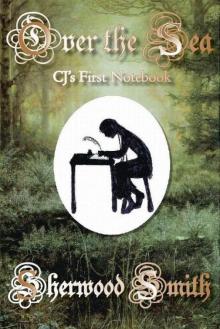 Over the Sea
Over the Sea Senrid
Senrid Hunt Across Worlds
Hunt Across Worlds A Sword Named Truth
A Sword Named Truth The Fox
The Fox Twice a Prince
Twice a Prince Fair Winds and Homeward Sail: Sophy Croft's Story
Fair Winds and Homeward Sail: Sophy Croft's Story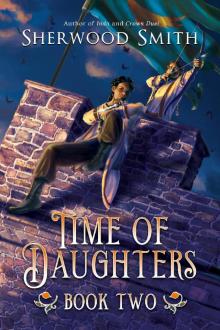 Time of Daughters II
Time of Daughters II The Rifter's Covenant
The Rifter's Covenant The Phoenix in Flight
The Phoenix in Flight Stranger
Stranger The Thrones of Kronos
The Thrones of Kronos A Prison Unsought
A Prison Unsought Twice a Prince: Sasharia En Garde Book 2
Twice a Prince: Sasharia En Garde Book 2